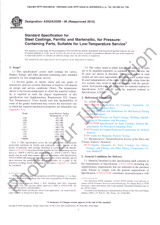Wir benötigen Ihre Einwilligung zur Verwendung der einzelnen Daten, damit Sie unter anderem Informationen zu Ihren Interessen einsehen können. Klicken Sie auf "OK", um Ihre Zustimmung zu erteilen.
ASTM E515-11(2022)
Standard Practice for Leaks Using Bubble Emission Techniques
Name übersetzen
NORM herausgegeben am 1.6.2022
Informationen über die Norm:
Bezeichnung normen: ASTM E515-11(2022)
Ausgabedatum normen: 1.6.2022
SKU: NS-1066843
Zahl der Seiten: 4
Gewicht ca.: 12 g (0.03 Pfund)
Land: Amerikanische technische Norm
Kategorie: Technische Normen ASTM
Kategorie - ähnliche Normen:
Die Annotation des Normtextes ASTM E515-11(2022) :
Keywords:
bubble leak testing, film solution leak test, immersion leak test, leak testing, vacuum box leak testing ,, ICS Number Code 19.100 (Non-destructive testing)
Ergänzende Informationen
| Significance and Use | ||||||||||
|
6.1?The immersion technique is frequently used to locate leaks in sealed containers. Leaks in a container can be seen independently. Leak size can be approximated by the size of the bubble. It is not suitable for measurement of total system leakage. 6.2?The liquid film technique is widely applied to components and systems that can not easily be immersed and is used to rapidly locate leaks. An approximation of leak size can be made based on the type of bubbles formed, but the technique is not suitable for measuring leakage rate. It can be used with a vacuum box to test vessels which cannot be pressurized or where only one side is accessible. 6.3?AccuracyThis practice is not intended to measure leakage rates, but to locate leaks on a go, no-go basis. Their accuracy for locating leaks of 4.5 ? 10 ?10 mol/s (1 ? 10?4 Std cm3/s)2 and larger is ?5 %. Accuracy for locating smaller leaks depends upon the skill of the operator. 6.4?RepeatabilityOn a go, no-go basis, duplicate tests by the same operator should not vary by more than ?5 % for leaks of 4.5 ? 10 ?9 mol/s (1 ? 10?4 Std cm3/s).6.5?ReproducibilityOn a go, no-go basis, duplicate tests by other trained operators should not vary by more than 10 % for leaks of 4.5 ? 10 ?9 mol/s (1 ? 10?4 Std cm3/s)2 and larger. |
||||||||||
| 1. Scope | ||||||||||
|
1.1?This practice covers procedures for detecting or locating leaks, or both, by bubble emission techniques. A quantitative measure is not practical. The normal limit of sensitivity for this test method is 4.5 ? 10?10 mol/s (1 ? 10?5 Std cm3/s).1.2?Two techniques are described: 1.2.1?Immersion technique, and 1.2.2?Liquid application technique. Note 1:?Additional information is available in ASME Boiler and
Pressure Vessel Code, Section V, Article 10-Leak Testing, and Guide
E479.
1.3?The values stated in SI units are to be regarded as standard. No other units of measurement are included in this standard. 1.4?This standard does not purport to address the safety concerns, if any, associated with its use. It is the responsibility of the user of this standard to establish appropriate safety, health, and environmental practices and determine the applicability of regulatory limitations prior to use. 1.5?This international standard was developed in accordance with internationally recognized principles on standardization established in the Decision on Principles for the Development of International Standards, Guides and Recommendations issued by the World Trade Organization Technical Barriers to Trade (TBT) Committee. |
||||||||||
| 2. Referenced Documents | ||||||||||
|
Empfehlungen:
Aktualisierung der technischen Normen
Wollen Sie sich sicher sein, dass Sie nur die gültigen technischen Normen verwenden?
Wir bieten Ihnen eine Lösung, die Ihnen eine Monatsübersicht über die Aktualität der von Ihnen angewandten Normen sicher stellt.
Brauchen Sie mehr Informationen? Sehen Sie sich diese Seite an.




 Cookies
Cookies
